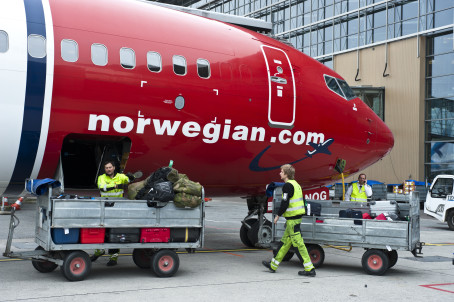No products in the cart.
Unions cry foul over Norwegian subsidiary’s FACP request
 Several labor unions and rival trans-Atlantic carriers are concerned about Norwegian Air Shuttle’s most recent application for a foreign air carrier permit (FACP) for its new subsidiary, Norwegian Air UK Ltd. (NAUK). Opponents are calling the move nothing more than an attempt to fly under a “flag of convenience” so it can operate in the North America market at less expense, sidestepping Norway’s more stringent labor laws.
Several labor unions and rival trans-Atlantic carriers are concerned about Norwegian Air Shuttle’s most recent application for a foreign air carrier permit (FACP) for its new subsidiary, Norwegian Air UK Ltd. (NAUK). Opponents are calling the move nothing more than an attempt to fly under a “flag of convenience” so it can operate in the North America market at less expense, sidestepping Norway’s more stringent labor laws.
NAUK applied to the U.S. Department of Transportation (DOT) for a FACP on Dec. 11, 2015, to operate scheduled and charter flights to the U.S. from its London-Gatwick base. Another subsidiary, Norwegian Air International (NAI), based in Dublin, applied for a FACP in December 2013 for operations to the United States, but that application is still pending with the DOT because of a coalition led by the Transportation Trades Department, blocking it for violating terms and conditions of the U.S.-European Union open skies agreement with regard to the proposed employment model. As with the NAI application, the numerous labor unions participating in this latest protest against NAUK’s move are alarmed by the lack of details on the application.
While most of the dispute is over passenger flights, the FACP is of concern in the airfreight industry because of the aircraft that Norwegian Air Shuttle flies on its long-haul routes: the cargo-friendly 787-9, capable of carrying up to 20 tonnes of belly cargo. According to The Loadstar, the carrier’s cargo arm, launched in 2013, grew 40 percent in volume in the first nine months of 2015 and is poised to become a larger part of its business this year, with four more expected 787-9 deliveries in 2016. Norwegian Cargo deals with general and perishable cargo, but does not carry dangerous goods, live animals, human remains or oversize loads.
NAI has been staffing its long-haul flights with Thailand-based flight crews, who are employed by non-European crew supply companies that use employment contracts based on Asian and Singapore law. As a result, these staff are working under conditions that are “substantially inferior,” said the request to the DOT by labor unions that are party to the complaint. NAUK’s application, they said, contains no information as to the employment arrangements that will apply to pilots and flight attendants who would staff NAUK’s flights.
A spokesman for Norwegian said “Norwegian already has major operations at UK airports, including a large base of more than 400 pilots and crew, and our expansion plans will help create several hundred more jobs in the UK. All current and future employees in our operation at UK bases will have contracts governed by UK employment law.” He said the airline looks forward to the DOT’s consideration of the UK application.
The labor organizations who are opposed to NAUK’s request are the Air Line Pilots Association, Transportation Trades Department, Transport Workers Union of America, Association of Flight Attendants, International Association of Machinist and Aerospace Workers and the European Cockpit Association.
















